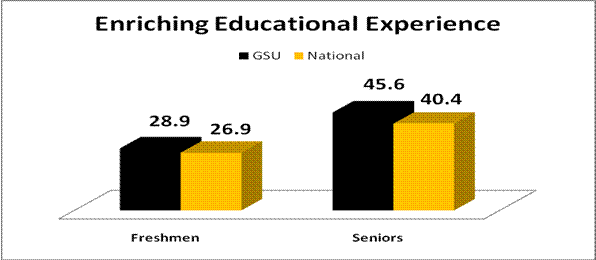Enriching Educational Experiences (EEE) Items
 Complementary learning opportunities enhance academic programs. Diversity experiences
teach students valuable things about themselves and others. Technology facilitates
collaboration between peers and instructors. Internships, community service, and senior
capstone courses provide opportunities to integrate and apply knowledge.
Complementary learning opportunities enhance academic programs. Diversity experiences
teach students valuable things about themselves and others. Technology facilitates
collaboration between peers and instructors. Internships, community service, and senior
capstone courses provide opportunities to integrate and apply knowledge.
- Hours spent participating in co-curricular activities (organizations, campus publications,
student gov., social fraternity or sorority, etc.)
- Practicum, internship, field experiences, co-op experiences, or clinical assignment
- Community service or volunteer work
- Foreign language coursework and study abroad
- Independent study or self-designed major
- Culminating senior experience (capstone course, senior project or thesis, comprehensive
exam, etc.)
- Serious conversations with students of different religious beliefs, political opinions,
or personal values
- Serious conversations with students of a different race or ethnicity than your own
- Using electronic medium (e.g., listserv, chat group, Internet, instant messaging,
etc.) to discuss or complete an assignment
- Campus environment encouraging contact among students from different economic, social,
and racial or ethnic backgrounds
- Participate in a learning community or some other formal program where groups of students
take two or more classes together

Results of the survey are divided into five Benchmarks of Effective Educational Practices.
Click the links below for definitions of NSSE measures and survey results.
- Level of Academic Challenge
- Active and Collaborative Learning
- Student-Faculty Interaction
- Enriching Educational Experiences
- Supportive Campus Environment
RESOURCE LINK
National Survey of Student Engagement
 Complementary learning opportunities enhance academic programs. Diversity experiences
teach students valuable things about themselves and others. Technology facilitates
collaboration between peers and instructors. Internships, community service, and senior
capstone courses provide opportunities to integrate and apply knowledge.
Complementary learning opportunities enhance academic programs. Diversity experiences
teach students valuable things about themselves and others. Technology facilitates
collaboration between peers and instructors. Internships, community service, and senior
capstone courses provide opportunities to integrate and apply knowledge.